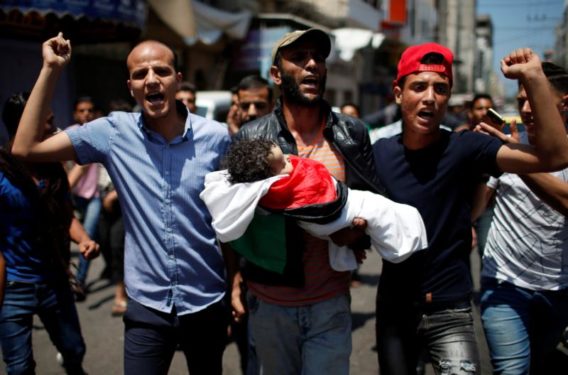
JERUSALEM (CNS) – As the world witnesses “another outburst of hatred and violence, which is once again bleeding all over the Holy Land,” the head of Jerusalem’s Latin Patriarchate called for prayers for peace.
“We need to pray more for peace and our conversion and for all,” said Archbishop Pierbattista Pizzaballa, apostolic administrator of the patriarchate, or diocese.
The Associated Press reported that the same day the United States was inaugurating its embassy in Jerusalem, Israeli forces shot and killed 57 Palestinians and injured more than 2,700 during mass protests along the Gaza border May 14. In addition, a baby died from tear gas inhalation, the Gaza Health Ministry said, bringing the death toll to 58.
“The lives of so many young people have once again been shut down and hundreds of families are mourning their loved ones, dead or wounded,” said the statement from Archbishop Pizzaballa. “As in a kind of vicious circle, we must condemn all forms of violence, any cynical use of human lives and disproportionate violence. Once again we are forced by circumstances to plead and cry out for justice and peace!”
He announced that May 19, the eve of Pentecost, the church would hold a prayer vigil at the Church of St. Stephen at L’Ecole Biblique. He asked the entire diocese to dedicate a day of prayer and fasting for the peace of Jerusalem and that the liturgy on Pentecost be dedicated to prayer for peace.
“We must truly pray to the Spirit to change our hearts to better understand his will and to give us the strength to continue to work for justice and peace,” the archbishop said.
Palestinians claim Jerusalem as their capital and now feel that, with its embassy there, the U.S. cannot be a fair broker in the peace process with Israel.
Many Israelis see opening the embassy as the long-awaited official recognition of Jerusalem as their capital and the fulfillment of a promise made by numerous U.S. presidents to move the building from Tel Aviv.
At St. Joseph Parish in Jifna, West Bank, May 14, Father Firas Aridah tolled bells at noon to mourn those injured and killed in clashes, to mark the commemoration of the day Palestinians call al-Naqba – their catastrophe – and to lament the opening of the U.S. embassy in Jerusalem. On May 14, 1948, Israel declared its independence; Palestinians commemorate that 250,000-300,000 Arabs living in the British mandate of Palestine were forced off their lands and homes at the time.
“Jerusalem is at the heart of the conflict,” he said.
“Opening the American embassy without resolving the conflict is going to the extreme. They can resolve the conflict of Jerusalem and then do whatever they want. But why just move the embassy to Jerusalem without resolving the conflict?”
The priest said although parishes in the Holy Land tell their parishioners to resist occupation by educating themselves and preparing for the future, people in Gaza see no future. He said he can stress to his school’s Christian and Muslim students that throwing stones is not worth dying for, but people in Gaza are desperate.
“They don’t have anything to lose,” he said. “They are not living in dignity.”
On May 15 Palestinians marked a moment of silence in commemoration of the Naqba, much like the Israelis did a month early on the Hebrew anniversary of Israeli independence.
Contributing to this story was Judith Sudilovsky.
